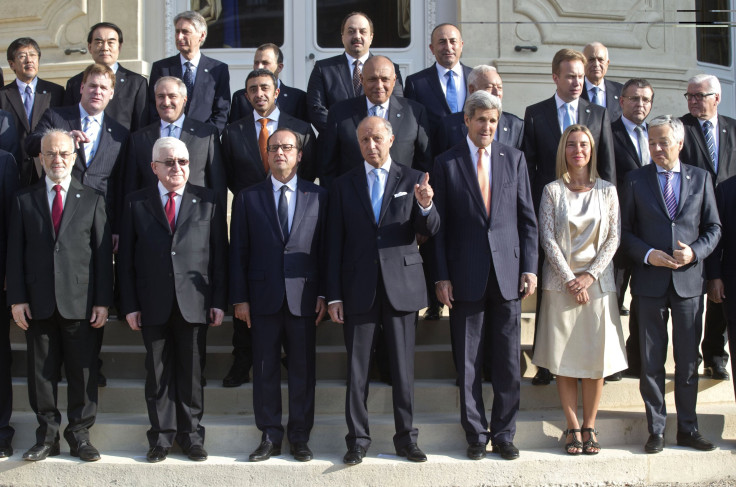France Urges 'Global' Response To ISIS Threat, Authorizes Reconnaissance Flights Over Iraq

Ahead of the Iraq Peace and Security Conference in Paris, a meeting convened to discuss strategies to defeat the Sunni extremist group Islamic State, French reconnaissance planes prepared to join the U.K. in carrying out surveillance flights over Islamic State strongholds in northeastern Iraq.
“This very morning, the first reconnaissance flights will be carried out in agreement with the Iraqi and Emirati authorities," French Defense Minister Jean-Yves Le Drian told French troops at the Al-Dhafra base in the United Arab Emirates, or UAE, barely hours before the start of the conference, according to Associated Press, or AP. The conference, which is being co-chaired by France and Iraq, will be attended by 26 countries from around the world, except Iran, which was not invited to the event.
Iraqi President Fouad Massoum, meanwhile, expressed reservations about the possible involvement of Egypt, UAE and Saudi Arabia in airstrikes on Iraqi territories.
“It is not necessary that they participate in airstrikes. What is important is that they participate in the decisions of this conference,” he told AP, highlighting the tensions among regional powers that could complicate the process of forming a Sunni alliance against Islamic State.
Speaking at the conference, Massoum also expressed regret over the fact that Iran was not invited to attend the conference, underscoring the close ties between the two Shia-dominated countries.
Iran's Ayatollah Ali Khamenei, the nation's top cleric, said in a statement on his official website, Al Jazeera reported, citing Agence France-Presse: "Right from the start, the United States asked through its ambassador in Iraq whether we could cooperate against Daesh (Arabic acronym for ISIS)," adding: "I said no, because they have dirty hands."
According to a BBC report, which cited an unnamed U.S. official, a number of Arab nations -- part of a broad coalition to fight Islamic State, clubbed together by United States Secretary of State John Kerry during his recently concluded tour of the Middle East -- have agreed to take part in the airstrikes in Iraq.
French President Francois Hollande, in his opening remarks at the conference, attended by leaders and diplomats from 26 countries, including Kerry, said: “There is no time to lose … the terrorist threat is global and the response must be global,” Al Jazeera reported.
The purpose of the conference, which is being held just two days after Islamic State militants released a video of the beheading of a British aid worker David Haines, “is to collect funds from friendly countries, to send necessary equipment, coordinate humanitarian aid, and to fight the (Islamic State) militants,” Hollande reportedly said.
Speaking in Paris on the sidelines of the conference, a U.S. official said the number of countries signing up to become a part of the global coalition was “going up almost every hour,” The Guardian reported.
© Copyright IBTimes 2024. All rights reserved.












